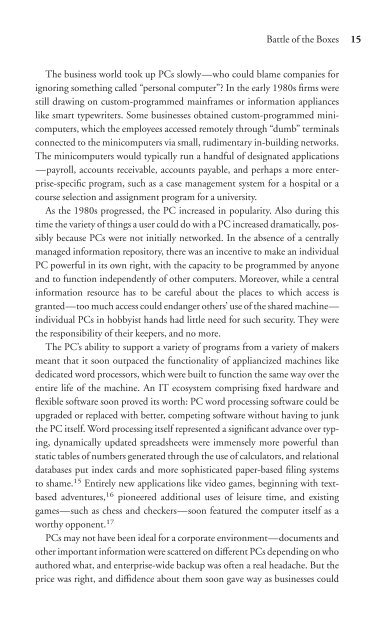Download - Future of the Internet â And how to stop it.
Download - Future of the Internet â And how to stop it.
Download - Future of the Internet â And how to stop it.
Create successful ePaper yourself
Turn your PDF publications into a flip-book with our unique Google optimized e-Paper software.
Battle <strong>of</strong> <strong>the</strong> Boxes 15<br />
The business world <strong>to</strong>ok up PCs slowly—who could blame companies for<br />
ignoring something called “personal computer” In <strong>the</strong> early 1980s firms were<br />
still drawing on cus<strong>to</strong>m-programmed mainframes or information appliances<br />
like smart typewr<strong>it</strong>ers. Some businesses obtained cus<strong>to</strong>m-programmed minicomputers,<br />
which <strong>the</strong> employees accessed remotely through “dumb” terminals<br />
connected <strong>to</strong> <strong>the</strong> minicomputers via small, rudimentary in-building networks.<br />
The minicomputers would typically run a handful <strong>of</strong> designated applications<br />
—payroll, accounts receivable, accounts payable, and perhaps a more enterprise-specific<br />
program, such as a case management system for a hosp<strong>it</strong>al or a<br />
course selection and assignment program for a univers<strong>it</strong>y.<br />
As <strong>the</strong> 1980s progressed, <strong>the</strong> PC increased in popular<strong>it</strong>y. Also during this<br />
time <strong>the</strong> variety <strong>of</strong> things a user could do w<strong>it</strong>h a PC increased dramatically, possibly<br />
because PCs were not in<strong>it</strong>ially networked. In <strong>the</strong> absence <strong>of</strong> a centrally<br />
managed information reposi<strong>to</strong>ry, <strong>the</strong>re was an incentive <strong>to</strong> make an individual<br />
PC powerful in <strong>it</strong>s own right, w<strong>it</strong>h <strong>the</strong> capac<strong>it</strong>y <strong>to</strong> be programmed by anyone<br />
and <strong>to</strong> function independently <strong>of</strong> o<strong>the</strong>r computers. Moreover, while a central<br />
information resource has <strong>to</strong> be careful about <strong>the</strong> places <strong>to</strong> which access is<br />
granted—<strong>to</strong>o much access could endanger o<strong>the</strong>rs’ use <strong>of</strong> <strong>the</strong> shared machine—<br />
individual PCs in hobbyist hands had l<strong>it</strong>tle need for such secur<strong>it</strong>y. They were<br />
<strong>the</strong> responsibil<strong>it</strong>y <strong>of</strong> <strong>the</strong>ir keepers, and no more.<br />
The PC’s abil<strong>it</strong>y <strong>to</strong> support a variety <strong>of</strong> programs from a variety <strong>of</strong> makers<br />
meant that <strong>it</strong> soon outpaced <strong>the</strong> functional<strong>it</strong>y <strong>of</strong> appliancized machines like<br />
dedicated word processors, which were built <strong>to</strong> function <strong>the</strong> same way over <strong>the</strong><br />
entire life <strong>of</strong> <strong>the</strong> machine. An IT ecosystem comprising fixed hardware and<br />
flexible s<strong>of</strong>tware soon proved <strong>it</strong>s worth: PC word processing s<strong>of</strong>tware could be<br />
upgraded or replaced w<strong>it</strong>h better, competing s<strong>of</strong>tware w<strong>it</strong>hout having <strong>to</strong> junk<br />
<strong>the</strong> PC <strong>it</strong>self. Word processing <strong>it</strong>self represented a significant advance over typing,<br />
dynamically updated spreadsheets were immensely more powerful than<br />
static tables <strong>of</strong> numbers generated through <strong>the</strong> use <strong>of</strong> calcula<strong>to</strong>rs, and relational<br />
databases put index cards and more sophisticated paper-based filing systems<br />
<strong>to</strong> shame. 15 Entirely new applications like video games, beginning w<strong>it</strong>h textbased<br />
adventures, 16 pioneered add<strong>it</strong>ional uses <strong>of</strong> leisure time, and existing<br />
games—such as chess and checkers—soon featured <strong>the</strong> computer <strong>it</strong>self as a<br />
worthy opponent. 17<br />
PCs may not have been ideal for a corporate environment—documents and<br />
o<strong>the</strong>r important information were scattered on different PCs depending on who<br />
authored what, and enterprise-wide backup was <strong>of</strong>ten a real headache. But <strong>the</strong><br />
price was right, and diffidence about <strong>the</strong>m soon gave way as businesses could


